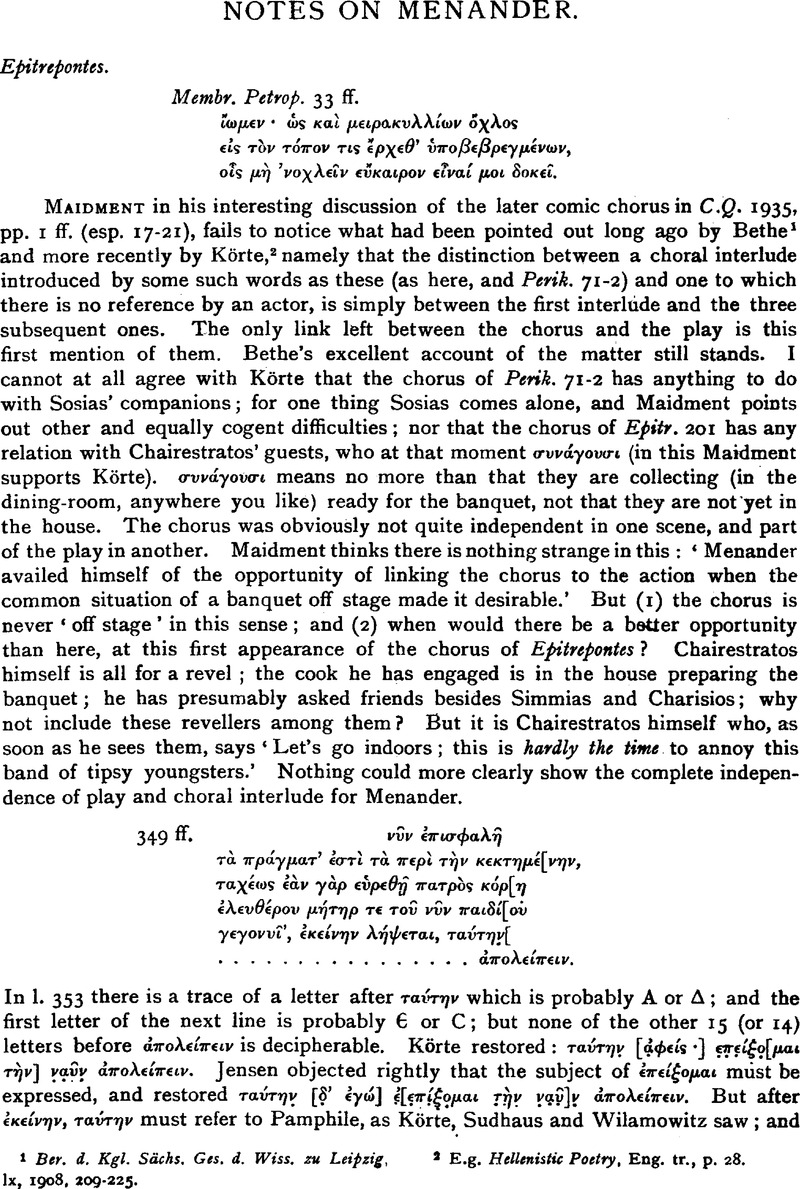No CrossRef data available.
Article contents
Notes on Menander
Published online by Cambridge University Press: 11 February 2009
Abstract

- Type
- Other
- Information
- Copyright
- Copyright © The Classical Association 1936
References
page 64 note 1 Ber. d. Kgl. Sächs. Ges. d. Wiss. zu Leipzig, lx, 1908, 209–225.
page 64 note 2 E.g. Hellenistic Poetry, Eng. tr., p. 28.
page 65 note 1 Wilamowitz seems to me certainly right in reading KAP1 as the speaker of 405, not XAP1 as Jensen (with, apparently, the papyrus).
page 65 note 2 ‘This side of the leaf is badly damaged and decipherment in places difficult and uncertain’ (Hunt). No facsimile of this fragment is given in Ox Pap. X, but to judge from that of No. 1225 in the same volume (pl. v), to which No. 1236 has a ‘general similarity,’ y in 1. 559 of Epitr. might well be q.
page 66 note 1 The words οὐδείς γἁρ αὐтῶν ἐσтιν Ӗξω (65) do not seem to refer to Doris' precautions, but to mean ‘No one (of Myrrine's household) is outside, so I must inquire within.’
page 68 note 1 If the context of fr. 2 is as Jensen supposes, then it will mean: ‘she will not recognize this κбσμος (and I don't want her to); still (ŏμως σέ)show it to her; it may help.’ But the line may be from elsewhere, for example, from the last scene of all: ‘all is now clear; still, show it to Myrrine; there may be some likeness to Moschion's γνωρḬσμαтα.’ And see above, p. 66, for the opening scenes.
page 69 note 1 It is this which makes it clear that тὴν ἐμὴν тεκοῦσαν μηтέρα cannot be Myrrine: he that is to say, mean ‘I don't believe Myrrine would have exposed her daughter, while bringing me up.’
page 69 note 2 Post can translate this: ‘I came to the conclusion that no man would saddle himself with infants to feed, when he was destitute, unless he had taken leave of his wits’; which is one way in which opinion is formed.
page 71 note 1 ‘Wie schwer war Habrotonon verkannt, wenn man sie σκαιόтαтε sagen liess,’ commented Wilamowitz on Epitr. 569. That is finely said; but it is not a grosser error than supposing Demeas spoke this line to Chrysis.
page 71 note 2 Moschion, too, was content; he did not go off in anger, as Wilamowitz said—he forgot that till 271–6.
page 72 note 1 Kõrte (Pauly-Wissowa, p. 758) strangely supposes that the action of the play takes place on the day Plangon's child is born (like Georgos, Heros, fabula incerta, Andria, Perinthia, Adelphoi, and original of Aulularia), and therefore her appearance on the stage impossible. I see no evidence for this at all.


